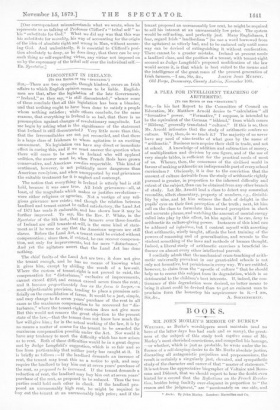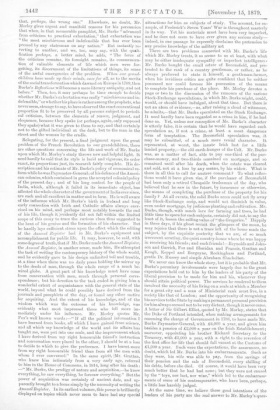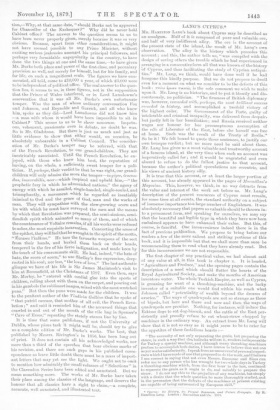BOOKS.
MR. JOHN MORLEY'S MEMOIR OF BURKE.* WHETHER, as Burke's worshippers must maintain (and no hero of the latter days has had such and so many), the great- ness of the subject of this study took captive some of Mr. Morley's most cherished convictions, and compelled his homage, —or whether, which is just as probable, he wrote under the in- fluence of a self-denying desire to do Mr. Burke absolute justice, discarding all antagonistic prejudices and prepossessions, the result is certainly a singularly just, elevated, and sympathetic study of the character and career of that "master of statesmen." his not from the appreciative biographer of Voltaire and Rous- seau and Diderot, that we should expect to hear the doubt even hinted for a second that the Reflections on the French Revolu- tion, besides being faultily over-eloquent in proportion to "the reason and the judgment," are "passionately on one side, and
* Burke. By John Morley. London: Macmillan and Co.
that, perhaps, the wrong one." Elsewhere, no doubt, Mr. Morley gives urgent and manifold reasons for his persuasion that when, in that memorable pamphlet, Mr. Burke "advanced from criticism to practical exhortation," that exhortation was "the most mischievous and indefensible that has ever been pressed by any statesman on any nation." But instantly re- verting to another, and we, too, may say, with the quali- fication perhaps, a better mind, he adds, "The force of the criticism remains, its foresight remains, its commemora- tion of valuable elements of life which men were for- getting, its discernment of the limitations of things, its sense of the awful emergencies of the problem. When our grand- children have made up their minds, once for all, as to the merits of the social transformation which dawned on Europe in 1789, then Burke's Reflections will become a mere literary antiquity, and not before." Then, too, it may perhaps be time enough to decide whether Mr. Burke's exhortation was really "mischievous and in- defensible," or whether his place is rather among the prophets, who never seem, strange to say, to have observed the exact conventional proportion fit to be preserved by all persons subject to periodi- cal criticism, between the elements of reason, judgment, and eloquence, because they spako (or perhaps, again, only supposed they spake) what it was given to them to say, and that certainly not to the gifted individual at the desk, but to the man in the street and the woman by the cradle.
Relegating, for the present, a final judgment .upon the great problem of the French Revolution to our grandchildren, there are other questions concerning the life and work of Mr. Burke upon which Mr. Morley's study throws new and helpful light. It need hardly be said that its style is lucid and vigorous, its order exact, its proportions just, its research fairly complete. His de- scription and his estimate of Mr. Burke's policy of economical re- form while he was Paymaster-General; of his defence of the Ameri- can colonies, which contained in germ the accepted colonialpolicy of the present day ; and of his long contest for the people of India, which, although it failed in its immediate object, has affected the whole character of the government of India over since, are each and all excellent in matter and in form. He is well aware of the influence which Mr. Burke's birth in Ireland and long early connection with Irish and Catholic affairs always exer- cised on his mind, and perhaps most notably towards the end of his life, though it :evidently did not fall within the limited scope of this essay to trace the curious clues thus suggested to the bent of his genius and the formation of his character. But he hardly lays sufficient stress upon the effect which the editing of the Annual Register had in Mr. Burke's equipment and accomplishment for public life. It, may, however, be said, with some degree of truth, that if Mr. Burke made the Aroma/ Register, the Annual Register, in another sense, made him, He attempted the task of writing the contemporary history of the whole world, and he evidently gave to his design unlimited toil and trouble, at a time when there was no daily press holding the mirror up to the deeds of man, through the whole range of a much be- wired globe. A great part of his knowledge must have come from conversation with men, much through personal corre- spondence; but his devotion to the task ended in giving him a wonderful extent of acquaintance with the general state of the world, beyond what be could possibly have derived from the journals and pamphlets of the day, or found any other motive for acquiring. And the extent of his knowledge, and of the wisdom which was the outcome of his knowledge, was evidently what most impressed those who fell more im- mediately under his influence. Mr. Morley quotes Mr.
Fox's well known words If all the political information I have learned from books, all which I have gained from science, and all which my knowledge of the world and its affairs has taught me, were put into one scale, and the improvement which I have derived from my right honourable friend's instruction and conversation were placed in the other, I should be at a loss to decide to which to give the preference. I have learnt more from my right honourable friend than from all the men with whom I ever conversed." In the same spirit, !Mr. Grattan, who knew him intimately from a very early ago, referred to him in the House of Commons, in 1814, long after his death: —" Mr. Burke, the prodigy of nature and acquisition,—he knew everything, he saw everything, he foresaw everything." But the power of acquisition was certainly of ancient date, and ap- parently brought to a focus simply by the necessity of writing the Annual Register. In its earliest volumes, this power is brilliantly displayed on topics which never seem to have had any special attractions for him as subjects of study. The account, for ex- ample, of Frederick's Seven Years' War is throughout masterly in its way. Yet his materials must have been very imperfect, and he does not seem to have over given any serious study— indeed, in one passage he expressly disclaims the pretension to any precise knowledge of the military art There are two problems connected with Mr. Burke's life which Mr. Morley treats, it so seems to us at least, with what may be either inadequate sympathy or imperfect intelligencc- Mr. Burke bought the small estate of Beconsfield, and pre- tended to the rank of a country gentleman, or rather, as he always preferred to state it himself, a gentleman-farmer, when his invidious critics are quite confident that he neither possessed nor could foresee his possession of the means to complete his purchase of the place. Mr. Morley devotes a page or two to the discussion of the rumours of the various Stock-Exchange speculations, in which Mr. Burke might, could, would, or should have indulged, about that time. But there is not an atom of evidence,—as, after raising a cloud of witnesses, he admits,—that Mr. Burke speculated on the Stock Exchange. It need hardly have been regarded as a crime in him, if he had done so. Yet, unless our conception of Mr. Burke's character is utterly false, it is certain that he would have regarded such speculation as, if not a crime, at least a most dangerous form of temptation. The Beconsfield speculation was, it may be submitted, of a much more venial character. It represented, at worst, the innate Irish lust for a little landed property,—the old earth-hunger of the Colt. Mr. Burke was, as a matter of fact, able to pay one-third of the pur- chase-money, and two-thirds remained on mortgage, and so remained until after his death, when the estate was cleared and sold, not at a loss by any means, by his widow. What is there in all this to call for austere comment ? To what reflec- tions would it have given rise, if the purchaser of Beconsfield had been only a retired Cheapside tradesman of the day, who believed that he saw in the future, by insurance or otherwise, the means of completing the purchase of the property for his family P At all events, the solid Bucks acres could not fly away like Stock-Exchange scrip, and would not diminish in value, even under mortgage, by judicious planting and cultivation. Mr..
Burke, though, with much love for farming and trees, he had little time to spare for such subjects, certainly did not, to say the least of it, lessen the selling value of "the Gregories." Happily in these days, if his ghost revisit the glimpses of the moon, he may rejoice that there is not a trace left of the home made the subject, by the exquisite posterity that we are, of so much irreverent scrutiny, the quiet country-house where he was happy in receiving his friends; and such friends I—Reynolds and John- son and Garrick, Fox and Sheridan and Francis, Grattan and Keogh, Keppel and Burgoyne, Rockingham and Portland, gentle Dr. Hussey and simple Abraham Shackelten.
We never can know the whole story, but it is probable that Mr. Burke's pecuniary involvements were largely due to the great expectations held out to him by the leaders of his party of the liberal provision to be made for him and his, whenever they should attain political power. The services he rendered to them involved the necessity of his living on a scale at which a Member for a great city and a man of Ministerial rank must live, in a society like that of London; and the opportunity of recognising his services to the State by making a permanent personal provision for him always seemed not to be very distant, though it never came. A letter of Sir Gilbert Elliot, quoted by Mr. Morley, states that the Duke of Portland intended, when making arrangements for resuming the charge of Government in 1788, to have made Mr. Burke Paymaster-General, with 24,000 a year, and given him besides a pension of 22,000 a year on the Irish Establishment ; moreover, appointing his brother Richard Secretary to the Treasury, with 23,000 a year, with a right to the reversion of the first office for life that should fall vacant at the Customs of 21,000 a year. Such were the expectations, the assurances, no doubt, which led Mr. Burke into his embarrassments. Such as they were, his wife was able to pay, from the _savings of their pension and the sale of Beconsfield, every shilling of his debts, before she died. Of course, it would have been very much bettor that be had had none ; but they were not caused by the "toys, nor lust, nor wine," which led to the embarrass- ments of some of his contemporaries, who have been, perhaps, a little less harshly judged.
At the same time, we believe these good intentions of the leaders of his party are the real answer to Mr. Morley's ques. tion,—Why, at that same date, "should Burke not be approved for Chancellor of the Exchequer P" Why did he never hold Cabinet office P The answer to the question seems to us to have been never properly given, merely because it was so very obvious. Because, apart from other considerations, it might not have seemed possible to any Prime Minister, without exciting serious jealousies amongst his principal followers, and perhaps very formidable unpopularity in the country, to have clone the two things at one and the same time,—to have given Mr. Burke both place and power of the first class, and pecuniary provision as well, not merely for himself, but for his family, and for life, on such a magnificent scale. The figures we have enu- merated, all told, come to £10,000 a year, of which £3,000 were -to be independent of political office. The real answer to the ques- tion lies, it seems to us, in these figures, not in the supposition that the Prince of Wales interfered, or in Lord Lansdowne's asseveration that it was all Mr. Burke's own unfortunate temper. Was the man of whose ordinary conversation Fox and Johnson, and Reynolds and Garrick, and all who know him, spoke as they did—Lord Lansdowne did not know him —a man with whom it would have been impossible to sit in Cabinet P This seems to us to be sheer nonsense. Impetu- ous, vehement, passionate even in debate, no doubt he was. So is Mr. Gladstone. But there is just as much and just as little evidence to show that either would, on occasion, be absolutely unbearable in a Cabinet Council. The consider- ation of Mr. Burke's temper may be referred, with that of the French Revolution, to our grand-children. They are inextricably associated. Until the French Revolution, he en- joyed, with those who knew him best, the reputation of having, on the whole, a sufficiently sweet temper for a poli- tician. 11,perhaps, their verdict be that he was right, our grand- children will only admire the more the temper—impiger, iracum- due, inexorabilis, acer—which inspired and upheld him,—" the prophetic fury in which he admonished nations," the agony of energy with which he assailed, single-handed, single-souled, and triumphantly, a movement which he regarded as insatiably inimical to God and the grace of God, man and the works of man. They will sympathise with the slow-growing scorn and ire with which he must have surveyed the men and the means by which that Revolution was prepared, the semi-simious, semi- fiendish spirit which animated so many of them, and of which the countenance of Voltaire remains, if all his works were reduced to ashes, the most exquisite incarnation. Converting the sense of the epithet, they willfeel that he wrought in the spirit of the motto, 4‘torasez l'infime." He tore the favourite weapons of the sect from their hands, and hurled them back on their heads, tempered in the fire of his fierce indignation, and made keen by the touch of his consummate skill. He had, indeed, "the hate of hate, the scorn of scorn," to NH Sh011ey'S fine expression, deep- rooted in his soul; nor less, "the love of love." The last authentic glimpse we have of his life is Sir James Macintosh's visit to him at Beconsfield, at the Christmas of 1797. Even then, says Mr. Morley, he "entered with cordial glee into the sports of children, rolling about with them on the carpet, and pouring out in his gambols the sublimest images, mixed with the most wretched puns." But then the puns were made for the children. It was to the penitent author of the Vinclicia) Gallicco that he spoke of 4' that putrid carcase, that mother of all evil, the French Revo- lution ; " and said it reminded him of the accursed things that crawled in and out of the mouth of the vile hag in Spenser's " Cave of Error," repeating the stately stanza line by line.
It is time that some publishers, if not the University of Dublin, whose pious task it might well be, should try to give us a complete edition of Mr. Burke's works. The best, that published by Messrs. Rivington's in 1856, has been long out of print. It does not contain all his acknowledged works, nor more than a third of the speeches that bear obvious marks of his revision, and there are such gaps in his published corre- spondence as leave little doubt there must be a mass of import- ant letters that may yet see the light. We ought not to omit to mention how admirably the small volumes of " Selections" in the Clarendon Series have been edited and annotated. But we mean something more. The works of Mr. Burke have taken their place among the classics of the language, and deserve the honour that all classics have a right to claim,—a complete, accurate, well annotated, and illustrated text.




































 Previous page
Previous page